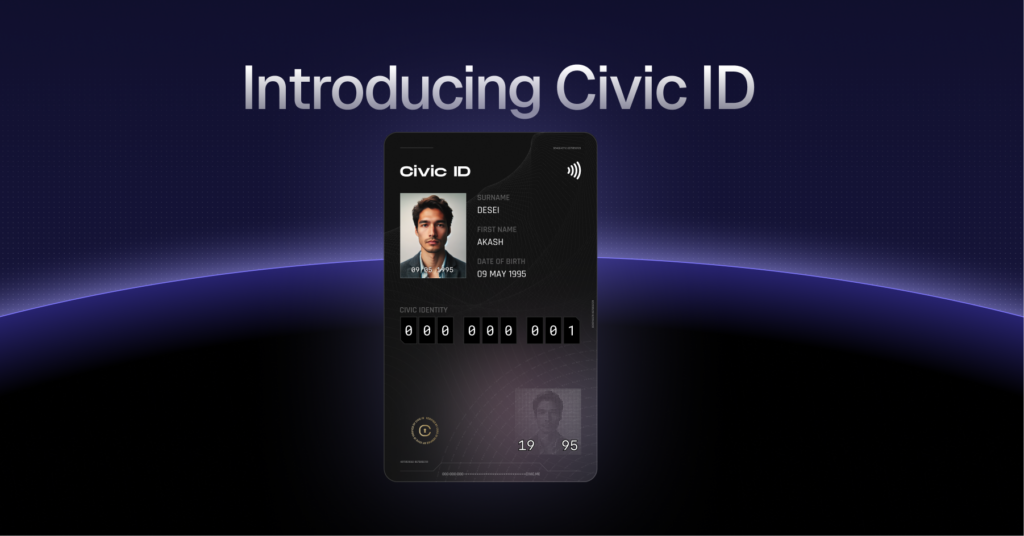
SAN FRANCISCO (26 March 2024) – Civic, a leader in digital identity verification, today announced its physical ID card as part of the Civic ID System, marking a step forward in private, compliant, and user-focused identity solutions. The global ID card is usable and receivable across 190 countries.
“Our vision at Civic is a future where user-controlled digital identity is the standard for authentication and authorization across all digital interactions. We’re very aware of the challenges that the rapidly evolving AI world poses to human identity verification. Criminals are increasingly using cutting-edge AI technologies to bypass many of the checks and guardrails society has been using until now. By launching our physical ID card, we’re taking real steps towards protecting against fraudulent activity that takes place digitally,” says Vinny Lingham, Co-Founder and Chairman of the Board at Civic.
The Civic ID card forms the real-world bridge for the new Civic ID System, which consists of three components: a digital, analog, and mobile identity. The digital identity that exists currently through the Civic.me platform includes Civic Passes, which are private, non-transferable tokens that are verified credentials. The physical Civic ID card, announced today, forms the analog identity that has been developed with cutting-edge security features – including holograms, laser engraving, and optical variable ink – and enables offline and NFC-based verification for secure checks. The final, hybrid aspect, enables advanced identity management through both the analog physical card and the digital Civic Platform using Civic.me.
“Building a world where everyone has access to a trusted identity solution is not an exact science. The approach here is not dissimilar to the field of cybersecurity, which has standards but does not guarantee infallibility. Our efforts in digital identity are centered around packaging the best set of signals to demonstrate authentic verification as comprehensively as practicable, which we believe necessitates a physical component. By adding this layer of verification, Civic continues to exhibit our commitment to ensuring authenticity and trust remain at the core of every digital interaction,” says Chris Hart, CEO of Civic.
Distinguishing between humans and AI agents is becoming increasingly difficult with the development of every new AI technology. With OpenAI’s Sora AI that creates realistic and imaginative scenes from text instructions, and the availability of fake AI-generated IDs, the need to protect against fraudulent identity has become ever more urgent. Civic’s ID card will complement its digital-only products and serve as vital proof of identity, essential in an AI era when in-person verification will remain the most definitive proof of personhood.
Civic users can receive the physical ID at a designated physical address and undergo verification through an authorized provider. Users will also receive a new Civic Pass in their wallet, which acts as a customized soulbound token that represents an aspect of their digital identity. Civic’s platform enables users to manage their Civic Passes directly on Civic.me, allowing for instant signup and more control over identity management than competitors that call for app downloads or the need to go through specialized hardware.
Use cases that the physical ID card will help solve include a scheme called face farming, where scammers accumulate many verified wallets using video selfies that belong to others. Social media account takeovers and account fakes where people pose as celebrities, journalists, or friends to scam followers can be significantly decreased. Fake videos where authentic identity is crucial – such as in governmental elections – are also anticipated to be an important area to address this year.
The Civic ID card may also be co-branded for institutions, companies, and employers looking for comprehensive human verification methods. Civic’s platform is already used by Gitcoin Passport, Polygon ID, Realms, Fantom, Metaplex, Solana, Polygon, Arbitrum, Avalanche, Base, Ethereum, Optimism, and XDC.
Interested parties will be able to join the waitlist to get a physical ID card or offer it to their users, and provide feedback on the Civic website.
About Civic Technologies
Civic is a leading provider of identity management tools for web3, empowering people to easily and privately manage their identities across chains with an on-chain representation of their reusable identity. The company’s flagship product, Civic Pass, is an integrated permissioning tool that helps business customers enable secure access to their on-chain assets. Users may also manage their identity, presence and reputation with a dashboard. Civic aims to be the most trusted on-chain identity tool in the world, used by billions every day. Civic was co-founded in 2015 by Vinny Lingham and Jonathan Smith.
Media Contact: Debra Nita
Email: Debra@yapglobal.com
Telegram: @debranita
Media Contact: Sam O’Donohoe
Email: sam.odonohoe@yapglobal.com
Telegram: @samodonohoe